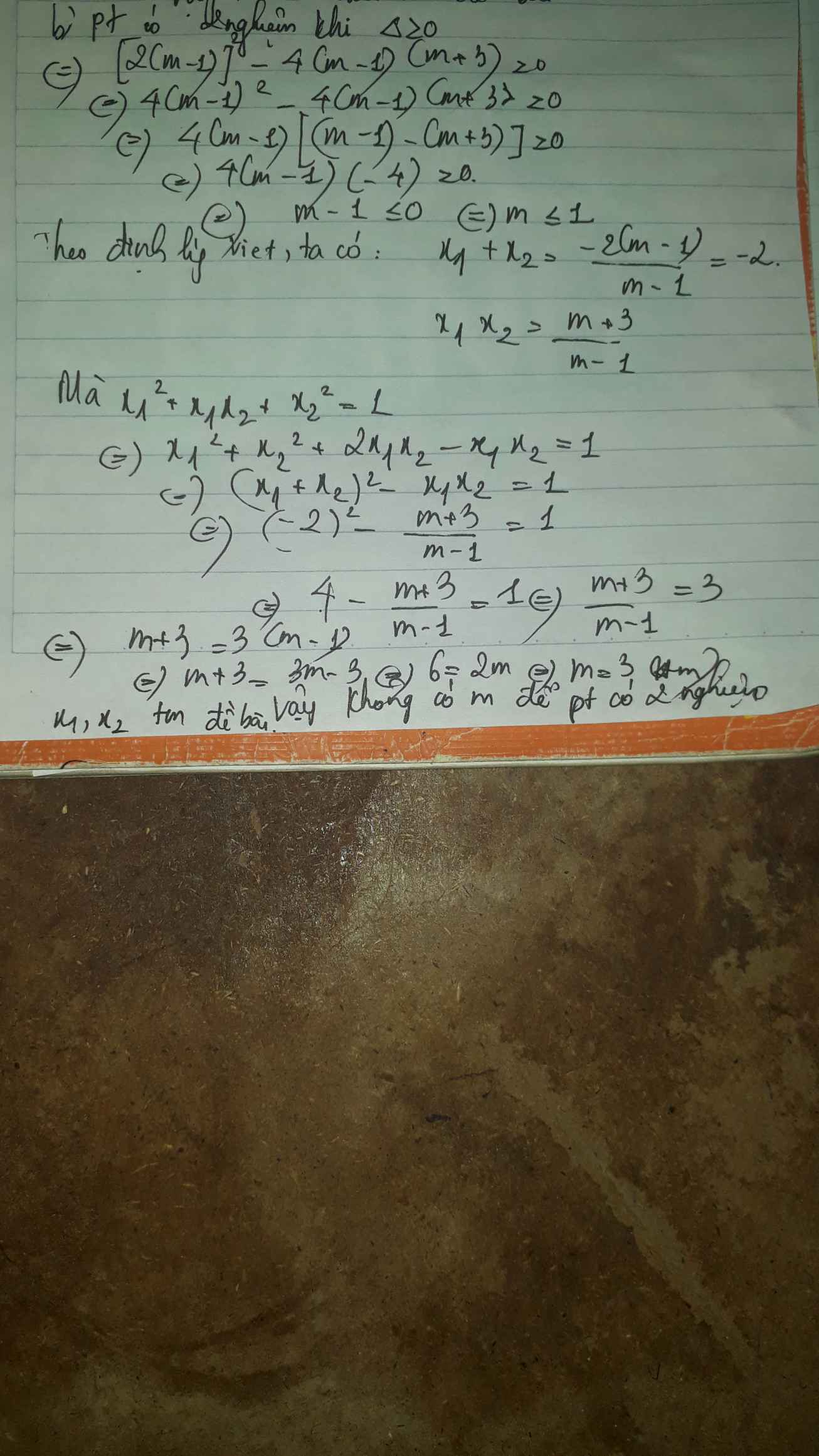Hãy nhập câu hỏi của bạn vào đây, nếu là tài khoản VIP, bạn sẽ được ưu tiên trả lời.

Bài 2:
a) Ta có: \(\Delta=\left(m-1\right)^2-4\cdot1\cdot\left(-m^2-2\right)\)
\(=m^2-2m+1+4m^2+8\)
\(=5m^2-2m+9>0\forall m\)
Do đó, phương trình luôn có hai nghiệm phân biệt với mọi m
Bài 1:
ĐKXĐ \(2x\ne y\)
Đặt \(\dfrac{1}{2x-y}=a;x+3y=b\)
HPT trở thành
\(\left\{{}\begin{matrix}a+b=\dfrac{3}{2}\\4a-5b=-2\end{matrix}\right.\\ \Leftrightarrow\left\{{}\begin{matrix}a=\dfrac{3}{2}-b\\4\left(\dfrac{3}{2}-b\right)-5b=-2\end{matrix}\right.\\ \Leftrightarrow\left\{{}\begin{matrix}a=\dfrac{3}{2}-b\\6-9b=-2\end{matrix}\right.\\ \Leftrightarrow\left\{{}\begin{matrix}b=\dfrac{8}{9}\\a=\dfrac{11}{18}\end{matrix}\right.\)
\(\Leftrightarrow\left\{{}\begin{matrix}x+3y=\dfrac{8}{9}\\2x-y=\dfrac{18}{11}\end{matrix}\right.\\ \Leftrightarrow\left\{{}\begin{matrix}y=2x-\dfrac{18}{11}\\x+3\left(2x-\dfrac{18}{11}\right)=\dfrac{8}{9}\end{matrix}\right.\\ \Leftrightarrow\left\{{}\begin{matrix}x=\dfrac{82}{99}\\y=\dfrac{2}{99}\end{matrix}\right.\)

\(\Delta=\left(m-1\right)^2+8\left(m+1\right)=\left(m+3\right)^2\ge0;\forall x\Rightarrow\) pt luôn có 2 nghiệm
Theo hệ thức Viet: \(\left\{{}\begin{matrix}x_1+x_2=-\dfrac{m-1}{2}\\x_1x_2=-\dfrac{m+1}{2}\end{matrix}\right.\)
\(\dfrac{1}{x_1^2}+\dfrac{1}{x_2^2}=\dfrac{25}{16}\Leftrightarrow\dfrac{x_1^2+x_2^2}{\left(x_1x_2\right)^2}=\dfrac{25}{16}\)
\(\Rightarrow\left(x_1+x_2\right)^2-2x_1x_2=\dfrac{25}{16}\left(x_1x_2\right)^2\)
\(\Rightarrow\left(\dfrac{m-1}{2}\right)^2+\dfrac{2\left(m+1\right)}{2}=\dfrac{25}{16}\left(\dfrac{m+1}{2}\right)^2\)
\(\Rightarrow9m^2+18m-55=0\Rightarrow\left[{}\begin{matrix}m=\dfrac{5}{3}\\m=-\dfrac{11}{3}\end{matrix}\right.\)

1:
\(=\left(\dfrac{1}{x-2\sqrt{x}}+\dfrac{2}{3\sqrt{x}-6}\right):\dfrac{2\sqrt{x}+3}{3\sqrt{x}}\)
\(=\dfrac{3+2\sqrt{x}}{3\sqrt{x}\left(\sqrt{x}-2\right)}\cdot\dfrac{3\sqrt{x}}{2\sqrt{x}+3}=\dfrac{1}{\sqrt{x}-2}\)

b) phương trình có 2 nghiệm \(\Leftrightarrow\Delta'\ge0\)
\(\Leftrightarrow\left(m-1\right)^2-\left(m-1\right)\left(m+3\right)\ge0\)
\(\Leftrightarrow m^2-2m+1-m^2-3m+m+3\ge0\)
\(\Leftrightarrow-4m+4\ge0\)
\(\Leftrightarrow m\le1\)
Ta có: \(x_1^2+x_1x_2+x_2^2=1\)
\(\Leftrightarrow\left(x_1+x_2\right)^2-2x_1x_2=1\)
Theo viet: \(\left\{{}\begin{matrix}x_1+x_2=-\dfrac{b}{a}=2\left(m-1\right)\\x_1x_2=\dfrac{c}{a}=m+3\end{matrix}\right.\)
\(\Leftrightarrow\left[-2\left(m-1\right)^2\right]-2\left(m+3\right)=1\)
\(\Leftrightarrow4m^2-8m+4-2m-6-1=0\)
\(\Leftrightarrow4m^2-10m-3=0\)
\(\Leftrightarrow\left[{}\begin{matrix}m_1=\dfrac{5+\sqrt{37}}{4}\left(ktm\right)\\m_2=\dfrac{5-\sqrt{37}}{4}\left(tm\right)\end{matrix}\right.\Rightarrow m=\dfrac{5-\sqrt{37}}{4}\)

Ta có: \(\Delta=4m^2+4m-11\)
Để phương trình có 2 nghiệm phân biệt \(\Leftrightarrow4m^2+4m-11>0\)
Theo Vi-ét, ta có: \(\left\{{}\begin{matrix}x_1+x_2=2m+3\\x_1x_2=2m+5\end{matrix}\right.\)
Để phương trình có 2 nghiệm dương phân biệt
\(\Leftrightarrow\left\{{}\begin{matrix}4m^2+4m-11>0\\2m+3>0\\2m+5>0\end{matrix}\right.\) \(\Leftrightarrow\left\{{}\begin{matrix}\left[{}\begin{matrix}m< \dfrac{-1-2\sqrt{3}}{2}\\m>\dfrac{-1+2\sqrt{3}}{2}\end{matrix}\right.\\m>-\dfrac{3}{2}\\m>-\dfrac{5}{2}\end{matrix}\right.\) \(\Leftrightarrow m>\dfrac{-1+2\sqrt{3}}{2}\)
Mặt khác: \(\dfrac{1}{\sqrt{x_1}}+\dfrac{1}{\sqrt{x_2}}=\dfrac{4}{3}\)
\(\Rightarrow\dfrac{x_1+x_2+2\sqrt{x_1x_2}}{x_1x_2}=\dfrac{16}{9}\) \(\Rightarrow\dfrac{2m+3+2\sqrt{2m+5}}{2m+5}=\dfrac{16}{9}\)
\(\Rightarrow18m+27+18\sqrt{2m+5}=32m+80\)
\(\Leftrightarrow14m-53=18\sqrt{2m+5}\)
\(\Rightarrow\) ...

Lời giải:
Để pt có 2 nghiệm thì:
$\Delta'=(m+1)^2-(m^2+m-1)\geq 0$
$\Leftrightarrow m+2\geq 0\Leftrightarrow m\geq -2$
Áp dụng định lý Viet, với $x_1,x_2$ là nghiệm của pt thì ta có:
$x_1+x_2=2(m+1)$
$x_1x_2=m^2+m-1$
Khi đó:
$\frac{1}{x_1}+\frac{1}{x_2}=4$
$\Leftrightarrow \frac{x_1+x_2}{x_1x_2}=4$
$\Leftrightarrow \frac{2(m+1)}{m^2+m-1}=4$
$\Rightarrow 2m^2+m-3=0$
$\Leftrightarrow (m-1)(2m+3)=0$
$\Leftrightarrow m=1$ hoặc $m=\frac{-3}{2}$ (đều thỏa mãn)

a: Thay m=-5 vào (1), ta được:
\(x^2+2\left(-5+1\right)x-5-4=0\)
\(\Leftrightarrow x^2-8x-9=0\)
=>(x-9)(x+1)=0
=>x=9 hoặc x=-1
b: \(\text{Δ}=\left(2m+2\right)^2-4\left(m-4\right)=4m^2+8m+4-4m+16=4m^2+4m+20>0\)
Do đó: Phương trình luôn có hai nghiệm phân biệt
\(\dfrac{x_1}{x_2}+\dfrac{x_2}{x_1}=-3\)
\(\Leftrightarrow x_1^2+x_2^2=-3x_1x_2\)
\(\Leftrightarrow\left(x_1+x_2\right)^2+x_1x_2=0\)
\(\Leftrightarrow\left(2m+2\right)^2+m-4=0\)
\(\Leftrightarrow4m^2+9m=0\)
=>m(4m+9)=0
=>m=0 hoặc m=-9/4
